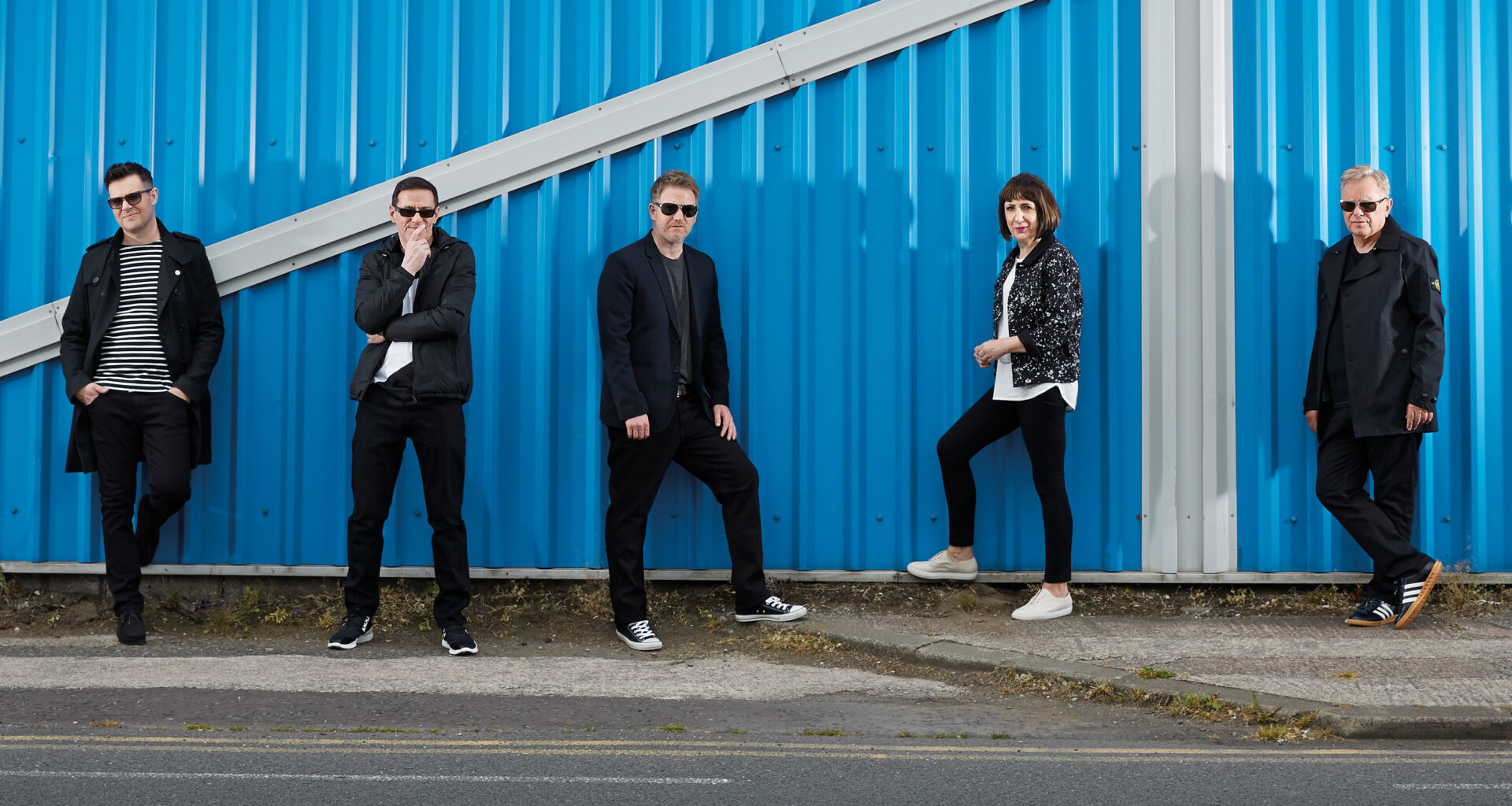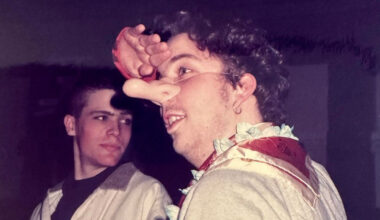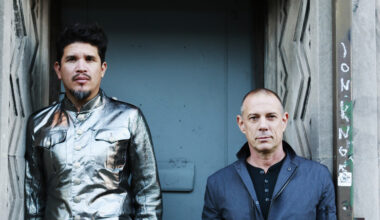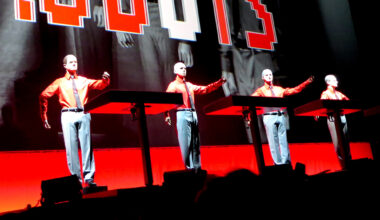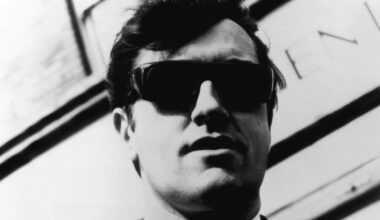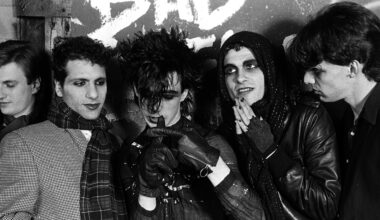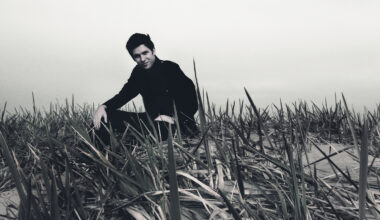After four decades at the coalface, New Order remain one of the coolest and hottest bands on the planet. How do you pull off a trick like that? In an exclusive interview, we talk to frontman Bernard Sumner about the group’s incredible staying power and their tireless push for perpetual forward motion
It’s a scorching afternoon in Palm Springs, southern California, where New Order are about to play two shows at the gigantic Coachella Festival, America’s answer to Glastonbury. It seems a fitting setting to talk about how the evergreen Mancunian electro-rock legends are, against all odds, basking in the blazing Indian summer of a stormy four-decade career. A sweltering Bernard Sumner excuses himself for a moment so he can take his shirt off as he chats.
Despite being dormant for much of the preceding 10 years, New Order’s 2015 comeback album, ‘Music Complete’, their debut for Mute Records, was a critical and commercial triumph. A full-blooded return to the band’s synth-saturated 1980s sound, it featured a glittering gallery of guests, including Iggy Pop, Stuart Price and Chemical Brother Tom Rowlands. The New Order live show is rolling again too, the majestic audio-visual spectacle earning rave reviews and filling arenas around the globe for the last 18 months.
Salford’s answer to Kraftwerk are back – rewired and rebooted.
After a bumpy few years of health scares and legal wrangles, there is a little more joy and a little less division in the New Order camp nowadays. At 61, Bernard Sumner certainly seems more mellow and more professional than he was during the band’s notoriously chaotic and hedonistic first decade as the star signings on Manchester’s fabled Factory label. He’s busier than ever too, with a new New Order live album to promote and a run of prestige hometown shows to rehearse.
But before that, at the end of May, he is a special guest speaker at the International Music Summit in Ibiza, the Davos of the electronic music world. His IMS appearance sees him following in the footsteps of the likes of Yello, Carl Craig and the Pet Shop Boys, but he’s a bit wary of his public speaking obligations.
“I hope it’s a question and answer thing… I don’t think I’ve ever made a speech in my life,” Sumner frowns. “I assume they are going to want to talk about electronic music. And since some of New Order’s past involved a spell in Ibiza, I guess they will want to talk about that as well. That period was just when acid house was about to happen. We were right on the cusp, with the Balearic beats that supposedly influenced Ibizan club music knocking around.”
Indeed, New Order’s ecstasy-fuelled Ibizan adventures have passed into musical folklore. The band began recording their sun-drenched electropop masterpiece ‘Technique’ on the island in the spring of 1988, as Ibiza-endorsed house music was about to explode across the mainstream.
“The studio wasn’t very good at all, but it had a swimming pool and a 24-hour bar, so we decided to go,” Sumner laughs. “We spent three months there. I remember distinctly we started in April and the weather was OK, it wasn’t too hot. Then it got hotter and hotter, and we started going out more and more. In the end, we were hiding from the sun, not doing any music, going to nightclubs all the time and getting into all sorts of scrapes. Amnesia was the club we used to go to. In those days it was open air, but I believe they’ve covered it since. It was a bit steep for a drink, but the price of alcohol meant… well, let’s just say we found other options.”
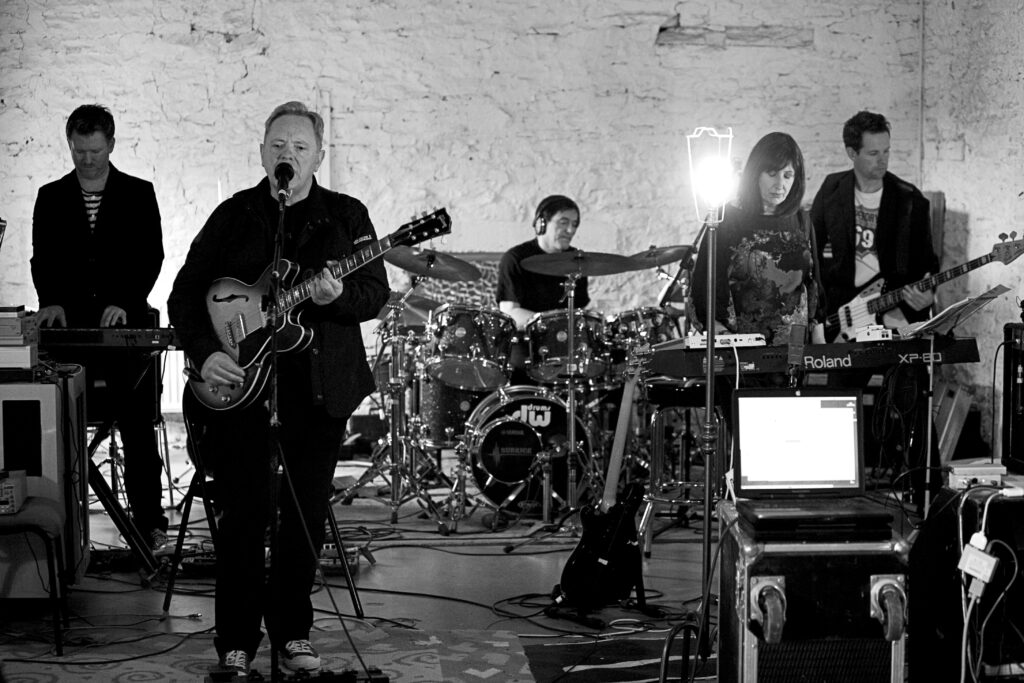
During the group’s extended stay on Ibiza, Sumner invited Factory labelmate and Happy Mondays party monster Bez to visit, unwisely lending him his driving licence. Numerous white-knuckle road trips and multiple car crashes followed. New Order roadie Terry Mason also somehow got Sumner to agree to a busload of 18-30 holidaymakers visiting the studio, where they proceeded to drink the band’s entire stock of booze and throw up everywhere.
“We were like, ‘Hey, that’s our job to do that!’,” Sumner recalls with mock exasperation.
In a break between the recording sessions, Sumner arranged a sailing trip from Ibiza to the nearby island of Formentera with another guest, Heaven promoter Kevin Millins, who was heavily hungover and “rolling around like a sausage on a barbecue”. On the choppy nocturnal voyage back to Ibiza Town, the boat got lost.
“Then Kevin died, unfortunately,” Sumner says with a straight face. “We threw his body overboard. This is the first time I’ve told anybody about it.”
This is Manc humour, of course, deadpan and dry as dust. A quick check confirms that Kevin Millins is still very much alive. Sumner isn’t joking when he says New Order left Ibiza with ‘Technique’ only “about 20 per cent” complete, though.
“The studio mysteriously burned down to the ground after we left,” he smirks. “I’m not saying it was an insurance job. I’m not saying that at all.”
The New Order frontman adds that he avoided Ibiza for more than two decades after making ‘Technique’, only returning when the band played the Ibiza Rocks festival in 2012.
“It would have killed me,” he laughs. “Those three months in 1988 nearly killed me. Can you imagine the state I was in when we came back? But I’m going to have a couple of days out there before I do IMS. I’ll need to find a quiet bit because I can’t do Party Central these days. You’ve got to remember that my life has been Party Central since I was 21, since we were in Joy Division.”
Bernard Sumner’s appetite for booze and drugs was certainly prodigious during New Order’s 1980s heyday. Nowadays, he claims he limits himself to two or three glasses of wine a night.
“Well, I stop counting after two glasses, anyway,” he grins. “I have to pace myself, because the hangovers get worse and worse as you get older. Even in Joy Division, I had terrible hangovers. I’ve had them since I was 17 or 18. Alcohol doesn’t agree with me, believe it or not. What I’m trying to say is I’ve finally learned my lesson.”
This healthier lifestyle, Sumner claims, is one factor behind New Order’s resurgent appetite for hard work, particularly in the form of live performances. Ahead of their two sets at Coachella, they have already played Dubai and Radio City Music Hall in New York this year. Famously, Sumner used to loathe touring, but now the goalposts have been moved.
“Yeah, I didn’t like it for a number of reasons,” he explains. “One was the hedonism that went with it. I used to make myself incredibly ill, but that was my own fault, no one else’s. And the other was… how can I say this tactfully? The vibe in the band wasn’t so good. But now the vibe is healthier, much less oppressive.”
This is a not-so-veiled reference to New Order’s former bassist Peter Hook, who Sumner will no longer even mention by name. Hook quit the band acrimoniously in 2007, unilaterally declaring the death of New Order.
Facing a potential legal challenge over continuing to use the group’s name, Sumner and guitarist Phil Cunningham regrouped as Bad Lieutenant, recruiting Tom Chapman on bass and with Joy Division and New Order drummer Stephen Morris helping out on Bad Lieutenant’s one and only album. In 2011, however, Sumner, Morris and fellow original member Gillian Gilbert, who returned to the fold after a break of around 10 years, reactivated the New Order name by setting up a company to replace Vitalturn, the company they shared with Hook.
Peter Hook was not best pleased and the lawyers on both sides have been kept pretty busy during the six years since then. The last time I interviewed Sumner, around 18 months ago, he talked openly about what he called “the atomic structure of the problem”. This time, with a court case finally looming, he offers no comment on his former Salford Grammar School classmate and long-time musical sparring partner.
Not that Sumner is devoid of competitive ego himself. He admits that he published his 2014 autobiography, ‘Chapter And Verse’, partly to counterbalance Hook’s own memoirs about Joy Division and New Order. As it happens, Sumner’s book was moving and revealing for other reasons, especially on the subject of his traumatic upbringing in working class Salford as the only child of a mother with cerebral palsy who would bully and beat him. Remarkably, he seems to bear no ill.
“It didn’t make me angry or bitter, but it made me a little hard-hearted,” he says. “I was a soft kid, you know? Salford people would say an experience like that toughens you up, but I didn’t really want to be toughened up. That’s the only way you can handle it, though, otherwise you are going to have a breakdown. Maybe the book was therapy, but it had no cathartic effect on me, no healing effect. The most difficult part was talking about my childhood. I’ve not got issues about it, but I didn’t really want to drag it up again. I thought talking about it would help… and it didn’t.”
New Order have never been known as a political band, but over the past 18 months they have made increasingly bolder statements about a world in turmoil. In November 2015, at the Brixton Academy show in London which forms the basis of their new live album, ‘NOMC15’, the band arrived onstage beneath a giant video graphic of a fluttering French flag. This was a gesture of solidarity with the 130 people murdered in the French capital by Islamist gunmen just three days before, including 89 rock fans at an Eagles Of Death Metal show in the Bataclan concert hall.
“We’d played in Paris the week before, so having just been there it was even more of a shock,” Sumner recalls. “In fact, the time before that, we had played at the Bataclan. I remember that vividly. The attack was an affront to freedom, so we wanted to show our respect for the people of France and to honour everyone affected by the events in Paris.”
Last summer, shortly after the Brexit vote, New Order played at the Glastonbury Festival beneath another flag, this time the blazing blue and yellow colours of the European Union.A few months later, Sumner penned a long piece for the ‘New European’ newspaper about the acrimonious fall-out from the referendum. The article was essentially a love letter to the dream of a united Europe. “As a musician,” he wrote, “I’ve always been massively influenced by Europe and its people, from the earliest days of Joy Division to our current touring commitments with New Order”. Six months later, he is still seething about the Leave vote.
“Brexit feels xenophoboic to me… and I’m not xenophobic,” he explains. “I embrace other cultures, especially European cultures because I am European. I don’t want to go back to the 1950s or the 1960s, that idea stinks. I personally think there should have been an age limit on voters, because it’s the young people who are going to have to live with this decision. Even now, a year after voting, they still haven’t got a fucking clue what’s going to happen.”
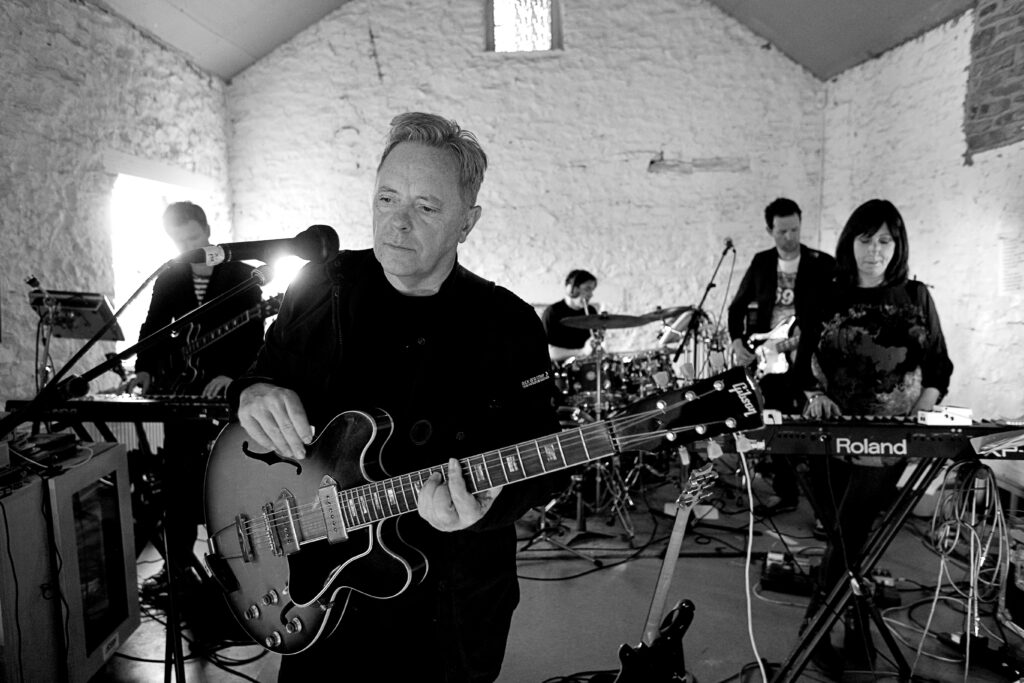
Ironically, the post-Brexit slump in the value of the pound has proved to be unexpectedly lucrative for New Order.
“We benefit greatly from it because of the exchange rate,” Sumner notes. “We do most of our work abroad and we benefit because the pound is so weakened. So I’m not criticising Brexit from a selfish point of view, and I don’t think the EU is perfect, but the thing they should have done was strive harder than they did to try to change it. I think it was just too complicated a question to ask people.”
Sumner’s first European jaunt as a fully signed up member of a band was with Joy Division 37 years ago. The tour culminated in a legendary gig at the Kant Kino cinema in snowy West Berlin.
“I don’t remember much about it, but it was very cold and not many people turned up,” he says. “It was really early for us, so we were just getting used to touring and to being abroad. Going to Europe in those days was really exotic.”
Joy Division’s one and only Berlin show was organised by Manchester exile Mark Reeder, a key figure on Berlin’s arty-party underground scene and in electronic music generally. Even today, Reeder remains a good friend of New Order and has remixed several tracks from the ‘Music Complete’ album. The band also used a montage from Reeder’s retrospective Berlin documentary, ‘B-Movie: Lust And Sound’, as the video for their ‘Singularity’ single.
“Mark’s a dear friend and a good person,” Sumner says. “He’s incredibly funny and quite eccentric too, but he’s Mancunian so he’s in the club. I think we’re like-minded people. I saw him a few months ago when he came over to Manchester. He’s not just friends with me, he’s friends with the whole band. If we play in Berlin, he usually gives a little speech before we go onstage.”
Manchester remains a key element of New Order’s DNA. All the band members still live in and around the city, and their hometown continues to celebrate their legacy. In June and July, as part of the Manchester International Festival, the group will play five bespoke shows with a 12-piece synthesiser orchestra in the old ‘Coronation Street’ sound stage at Granada TV studios.
Former Factory Records sleeve designer Peter Saville, who serves as artistic advisor to the festival, gave New Order the brief for the performances: “modern and original”. Having played two rapturously received nights at the Sydney Opera House last year with the Sydney Chamber Orchestra, the band proposed something similar for Manchester, but with an all-electronic ensemble. The location of the Granada shows, where the late Factory label co-founder Tony Wilson worked as a TV presenter, also resonated with New Order.
“The main title of the shows is a mathematical formula, but it is subtitled ‘So It Goes’, which was Tony Wilson’s TV programme in the late 70s,” Sumner explains. “Joy Division didn’t play on that, but we did play on Granada courtesy of Tony. I think it was on ‘Granada Reports’, on the end of the local news. It was the first time we did anything on television in our lives and it did us a lot of good. We’ve got fond memories of Granada and our association with Tony, so it’s a nice venue for us to come back to.”
The Manchester performances will bring together New Order, a dozen synthesiser players, and conductor Joe Duddell, plus stage designs by New York-based British conceptual artist Liam Gillick. After just two rehearsals so far, Sumner admits he feels a little overwhelmed at the “massive technical hurdles” of working with 18 people on the same stage.
“It’s been a trip down memory lane as far as synthesiser sounds go,” he says. “Some of the synth sounds we had in Joy Division, like on ‘Heart And Soul’, moody background stuff, you just can’t do unless you get that original synth. Well, you can, but it sounds like a facsimile. You’ve got to get the original synth and sample it up, and that’s been a horrendous amount of work. Also the technical aspect of working it all up. All the players are going to be sight readers, so we have to have laptops with the music score on them.”
The set list for the Granada shows will not feature ‘Blue Monday’, but will give an outing to some vintage tracks that New Order rarely play live. Even so, this seems an unusually nostalgic move for a band who have always been great future-facing modernists, resisting the urge to curate and repackage their back catalogue like most veteran bands. After all, they waited almost 20 years after the death of Ian Curtis before they started dropping Joy Division songs into their live sets.
“Absolutely right, I’m not nostalgic whatsoever,” Sumner agrees. “Don’t look back, it’s always been about the future. Without that attitude, I wouldn’t be here today, and we wouldn’t have come up with tunes like ‘Blue Monday’ or ‘Temptation’ or ‘Everything’s Gone Green’ or ‘Bizarre Love Triangle’ in the first place. Right from the early days of Joy Division, I always had a nagging thought in the back of my head: wouldn’t it be fabulous if you could discover a new kind of music?”
At the same time, Sumner concedes, New Order are also a band of contradictions. Iconoclasts who became icons, living legends who outlasted their own myth, working class local heroes who transformed themselves into global superstars, fragile human beings making indestructible music. They may not be playing ‘Blue Monday’ in Manchester, but there will be plenty of other old New Order classics. Are the ultimate pop futurists making peace with their past and resting on their laurels at last?
“Yes, but now’s the time in life when we can afford to do that,” Sumner laughs softly. “We’ve earned it.”
